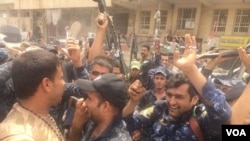Iraqi security forces said Saturday that they expected to declare victory in Mosul within hours, which could eliminate the Iraqi half of the Islamic State caliphate.
"Our units are still continuing to advance," the Joint Operations Command said. "Not much is left before our forces reach the [Tigris] river."
Earlier Saturday, an Iraqi military spokesman said on state television that militant defense lines were collapsing.
"We are seeing now the last meters, and then final victory will be announced," the spokesman said.
An Iraqi declaration of victory "is imminent," U.S. Brigadier General Robert Sofge told the AFP news agency in Baghdad.
Iraqi officials predicted the defeat of IS several times over the past week as forces confined the militants to a small area of Old Mosul along the Tigris. In recent days, however, the pace of troop advancement had slowed.
Iraqi forces are using coalition airstrikes and ground support for the offensive to take back Mosul, by far the largest city seized by Islamic State in its offensive three years ago when the ultra-hard-line group declared its caliphate over adjoining parts of Iraq and Syria.
Eight months of fighting has devastated much of Old Mosul, including the landmark 850-year-old Grand al-Nuri mosque and its leaning 45-meter minaret that jihadists recently blew up.
Stripped of Mosul, Islamic State’s dominion in Iraq will be reduced to mainly rural, desert areas west and south of the city, where tens of thousands of people live. The militants are expected to keep up attacks on selected targets across Iraq. They have promised to "fight to the death."
The United Nations has predicted it will cost more than $1 billion to repair basic infrastructure in Mosul. Iraq’s regional Kurdish leader said Thursday in a Reuters interview that the Baghdad central government had failed to prepare a post-battle political, security and governance plan.
The offensive has damaged thousands of structures in Mosul’s Old City and destroyed nearly 500 buildings, satellite imagery released Thursday by the United Nations showed.
In some of the areas hit hardest, almost no buildings appear to have escaped damage, and Mosul’s dense construction means the extent of the devastation might have been underestimated, U.N. officials said.
Some information for this report came from Reuters and AFP.






